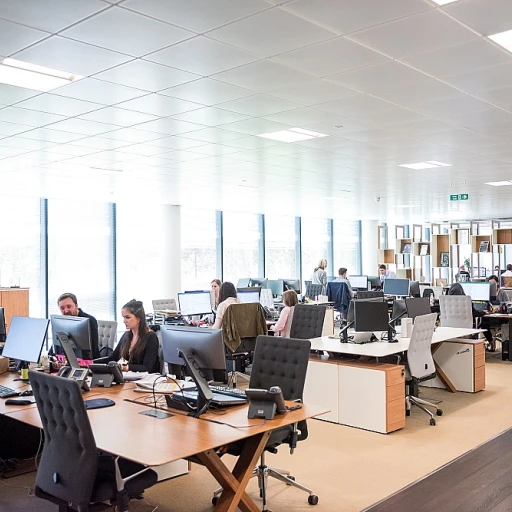
Defining a Retail Management System
Understanding the Basics of Retail Management Systems
In the dynamic world of retail, a Retail Management System (RMS) is a crucial tool that helps streamline operations and enhance the overall performance of a business. At its core, an RMS is a comprehensive software solution designed to manage various aspects of a retail store, from inventory management to customer relationship management. By integrating these functions, retail managers can ensure smoother store operations and improve customer satisfaction.
Retail management systems are equipped with features that facilitate real-time data tracking and analysis, which are essential for effective decision making. This capability allows retailers to monitor inventory levels, sales, and customer interactions, providing valuable insights into the business's performance. With the right system in place, retailers can optimize their inventory management, ensuring that popular products are always in stock while minimizing excess inventory.
Moreover, an RMS supports retail managers in enhancing customer service by providing tools for relationship management. This includes tracking customer preferences and purchase history, which can be used to tailor marketing efforts and improve the overall customer experience. By leveraging these insights, businesses can foster stronger customer relationships and drive sales growth.
For entrepreneurs looking to implement a retail management system, it's important to consider the specific needs of their business. Factors such as the size of the retail store, the complexity of operations, and the level of integration required with existing systems should all be taken into account. Additionally, investing in training for staff to effectively use the system is crucial for maximizing its benefits.
To delve deeper into the strategies for optimizing sales and enhancing retail operations, you might find it beneficial to explore mastering the art of conducting a sales workshop strategy. This resource can provide further insights into aligning your retail management practices with best practices in sales and customer engagement.
Key Features of Retail Management Systems
Essential Characteristics of Retail Management Systems
Retail Management Systems (RMS) are crucial for efficient store operations. They are equipped with features that help retailers enhance their business processes. A comprehensive RMS provides tools for inventory management, customer relationship management, and sales tracking, among others. One of the RMS's major functions is inventory management. By maintaining optimum inventory levels, businesses can prevent stockouts and overstocking, thus improving profitability. Integrating real-time data allows retail managers to make informed decisions swiftly, reflecting best practices in inventory management. Sales tracking is another vital feature. Retailers can monitor sales performance and identify trends, enabling them to execute strategies that drive customer satisfaction and enhance the overall customer experience. This data-driven approach to retail ensures all operations are aligned towards achieving business goals. Moreover, customer relationship management tools embedded in RMS facilitate personalized customer service. By analyzing customer data, retailers can tailor their offerings to improve customer satisfaction. As reported by industry experts, an RMS that includes these features ensures smooth store management and boosts operational efficiency. When selecting a management software, retailers must consider how well it can integrate with existing systems, including accounting software. The right choice will support seamless operations across various facets of the retail business. For more insights on optimizing RMS for financial reporting and decision-making, check out Unlocking the Potential of Financial Reporting Software. In conclusion, key features such as inventory tracking, sales monitoring, and customer management form the backbone of effective retail management systems. These elements empower retail businesses to adapt swiftly to market changes, ensuring they remain competitive and successful in the long run.Benefits for Entrepreneurs
Advantages for Entrepreneurs Embracing Retail Management System
Retail management systems (RMS) offer myriad benefits tailored for entrepreneurs seeking to streamline operations, enhance customer satisfaction, and drive sales growth. Implementing a robust retail management system can have transformative effects on a retail business.- Improved Inventory Management: One of the key features of an RMS is its ability to accurately track and manage inventory levels in real time. This data-driven approach reduces overstock and stockouts, ensuring that your retail store has the right products available for customers, thereby enhancing the overall customer experience.
- Enhanced Decision Making: With comprehensive management software, retail managers have access to critical data insights that support informed decision making. This empowers business owners to analyze sales trends, customer preferences, and operational performance, leading to strategic improvements and high customer satisfaction.
- Streamlined Operations: A retail management system integrates various facets of store management, such as sales, customer relationship, and inventory control, into a single platform. This integration minimizes manual errors and optimizes business operations, allowing staff to dedicate more time to improving customer service and store operations.
- Enhanced Customer Relationship and Satisfaction: RMS plays a critical role in relationship management by offering personalized customer experiences. Retail software can track customer data and buying patterns, facilitating tailored marketing strategies and increasing customer retention rates.
- Time and Cost Efficiency: By automating many aspects of your retail business, such as sales tracking and accounting, entrepreneurs can significantly reduce time spent on routine tasks. This efficiency leads to cost-saving opportunities and allows business owners to focus on growth-oriented strategies.
Challenges in Implementing Retail Management Systems
Addressing Potential Hurdles When Deploying a Retail Management System
Implementing a Retail Management System (RMS) can significantly enhance operations, yet it comes with its share of challenges that entrepreneurs need to navigate. Understanding these common obstacles will aid in better preparing your retail business for the transition.- Integration with Existing Systems: One of the primary challenges is ensuring seamless integration with current inventory management and accounting software. Without proper integration, retailers might face data discrepancies that could disrupt store operations.
- Employee Training: Introducing new retail software requires adequate employee training. Retail managers must ensure that time is allocated for comprehensive training sessions to get staff acquainted with the management systems, fostering improved customer service and satisfaction.
- Cost Considerations: The initial investment in a robust RMS can be daunting. Entrepreneurs must evaluate the costs against the potential improvements in sales and store management performance, ensuring that the financial input is justified by the expected benefits.
- Data Security: With more retail operations relying on software, protecting customer data becomes increasingly crucial. Establishing strong security protocols within the RMS to safeguard sensitive information against breaches is essential for maintaining customer trust.
- Customization Needs: Every retail business has unique needs. Off-the-shelf solutions may not provide the level of customization required to address specific store management challenges, necessitating additional development efforts to tailor the system features to meet business demands.
Choosing the Right System for Your Business
Factors to Consider When Selecting Your Retail Management System
Choosing the right retail management system (RMS) for your business is crucial for streamlining operations, enhancing the customer experience, and ultimately boosting sales. When sifting through the myriad of options available on the market, keep these key factors in mind:- Identify Your Business Needs: Before committing to any system, assess your specific retail operations requirements. Consider factors such as inventory management capacity, sales tracking, and the ability to integrate with existing accounting software. A system that aligns with your operations will enhance overall performance and boost customer satisfaction.
- Scalability: As your business grows, your RMS should support expansion. Ensure the system can handle increased data and customer demands without compromising on performance.
- User-Friendly Interface: A complex interface can hinder employee productivity. Opt for a management software that is intuitive and requires minimal training, enabling retail managers and staff to quickly adapt.
- Real-Time Data Access: An effective RMS should provide real-time data on inventory levels, sales, and customer activity. Access to up-to-date information aids in informed decision-making and enhances store management.
- Support and Training: Reliable customer service and training from the software provider are paramount. Ensure timely support is available for troubleshooting and maintaining optimal system performance.
- Integration Capabilities: The ability of the RMS to seamlessly integrate with other management systems in your retail store, such as customer relationship and inventory management software, is vital for cohesive operations.
- Cost: Finally, consider the total cost of ownership, including initial purchase price, installation, and future upgrades. Balance affordability with functionality to ensure you receive value for money without sacrificing essential features.
Future Trends in Retail Management Systems
The Evolution of Retail Management Technology
As retail technology continues to evolve at a rapid pace, retail managers must stay abreast of emerging trends in retail management systems to remain competitive. The integration of artificial intelligence and machine learning within retail management software is one of the most significant advancements. These technologies enable more precise decision making by analyzing large sets of data from sales, inventory, and customer behaviors, allowing for improved inventory management and enhanced customer experience.
Another trend is the growing importance of real time data. Retailers are increasingly using systems that provide live data updates across various operations, from inventory levels to customer relationship management. This immediacy allows for prompt adjustments in store management strategies and ensures customer satisfaction through better service.
The shift towards cloud-based management systems is also reshaping the retail landscape. By adopting cloud technologies, businesses can seamlessly integrate various retail management features, such as accounting software and sales tracking, into a cohesive system, enhancing both the flexibility and scalability of retail operations.
Retailers implementing these cutting-edge technologies benefit from more efficient performance and optimized business operations, resulting in more effective customer service and improved store profits. However, integrating these new technologies also requires structured training and adaptation to ensure retail teams can swiftly and effectively utilize the full capabilities of the systems.
Ultimately, the future of retail management lies in the blend of innovative technologies and the continuous improvement of key features within management systems, empowering businesses to navigate challenges and capitalize on opportunities in the ever-evolving retail business landscape.













